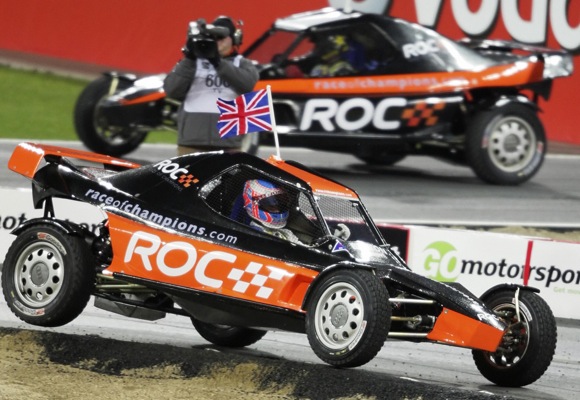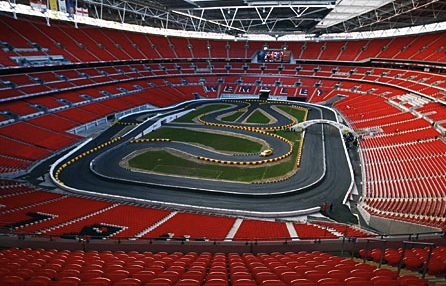The Olympics are upon us again, and as always I want to pose the obvious question: why isn’t motor racing part of the Olympics?
Okay, stop laughing and take this in. Back as far as the 1992 Barceona Games there were serious discussions about including motorsport in the Olympics, but nothing came of it. Is there any real reason why motor racing shouldn’t be part of the Olympics?
Those who cry “Amateur Athletics” are simply deluding themselves — the Olympics haven’t been in any way “Amateur” since it became a huge, money-generating business (mainly for the IOC…) many, many moons ago. And as for athletics — please… I have two words: table tennis. Don’t get me wrong, I am sure they are athletes, but imagine if someone came up to you at a party and told you they were an Olympic athlete. “Oh,” you would say, “What sport do you compete in?”. Could you keep a straight face if they answered “table tennis”? Didn’t think so. But table tennis makes it into the Olympics because it is a game of skill, speed, accuracy and endurance. Just like motorsport…
Take a look at the line up of sports at the London Edition of the Olympic Games: archery, athletics, badminton, basketball, beach volleyball, boxing, canoe slalom, canoe sprint, cycling (which includes road, track, BMX and mountain bike), diving, equestrian, fencing, football, gymnastics, handball, hockey, judo, modern pentathlon, rowing, sailing, shooting, swimming, synchronized swimming, table tennis, tae kwondo, tennis, trampoline, triathlon, volleyball, water polo, weightlifting and wrestling.
In there you have professional and amateur sports, sports that depend on the individual, sports that depend on team work, sports that require razor sharp skill and instincts, sports that demand a tough mental attitude and extreme concentration, sports that require top physical conditioning and sports that require physically attractive females to be clad in tight lycra. Motorsport demands all these things.
The IOC is apparently against any form of “motorised” competition, and purists cry that drivers aren’t athletes — they merely steer the car — and that there is too much reliance on mechanical reliability; that a competitor shouldn’t be robbed of a medal because of a mechanical failure.
This is all nonsense. A top level racing driver is every bit as much an athlete as anyone at the olympics — Aki Hintsa, head of “Human Performance” at McLaren F1, once claimed that his drivers at the time, Lewis Hamilton or Kimi Raikkonen, could easily have been Olympic athletes if they had chosen to train in another field. Well he would say that, wouldn’t he — what does he really know about Olympic athletes? Well, he is the former chief medical officer for the Finnish Olympic team, and has worked with more than 100 Olympic medalists. So I guess he knows a bit…
Drivers train constantly to achieve the required physical and mental fitness required to “steer the car” at maximum attack for up to several hours at a time because it is physically and mentally draining. Just because you can do it on the PlayStation for hours on end doesn’t mean it’s actually THAT easy, and besides, by that definition don’t the riders in equestrian events merely “steer” the horse?
And as for mechanical reliability, well, bicycles certainly aren’t bulletproof. Racquets, paddles, bows, guns, bats and boats all break, robbing the competitor of a medal. Hell, I’m sure the silly little nose plug things the sycronised swimmers use fall out occasionally too…
And speaking of sycronised swimming, lets look, for a minute, at some of the sillier sports in the current line up: Handball? Syncronised swimming and diving?? Beach Volleyball??? BMX and Mountain biking???? Not exactly “traditional” sports. And what about swimming?
Okay, so it’s a long established Olympic favourite, but look at it this way – there is one way to swim quickly — Freestyle. The others are all merely slower variations. Why have hundreds of races for dozens of medals for swimming slowly? It would be like having a world championship for driving an F1 car in reverse. Or parallel parking competition.
So what would an Olympic motor sport event look like anyway? The way I see it, there are two choices:
The first option is stock, bog-standard cars, all identical and sourced from the host country (or the country of their choice if the host has no local manufacturing). Think about that one – if Britain hosts, we have Ford Focus RS’s at Silverstone. If it’s Germany, we get M3s at Hockenheim (or, if we were really lucky, the proper Nurburgring…) If Australia hosts we could have HSVs around Bathurst.
It would consist of a series of endurance races, run in the form of a mini-championship, with the points forming the grid for the final race for the medals.
The second and most obvious choice is to simply use the International Race of Champions format that has been around for a few years, and was last year held n Dusseldorf’s Esprit Arena. A temporary track is set up in a stadium every year and motorsport stars from various countries compete across a series of different formulas, in cars including the ROC Buggy (custom built dune buggies), a sports car, a World Rally Car and a touring car, among others.
The concept is already fully-formed and in place, and would be no trouble to transfer to any stadium of the appropriate size anywhere in the world. The concept would only need to be expanded to run over a longer period.
A real test of the drivers minds and bodies. In the true spirit of the Olympics.




You must be logged in to post a comment.